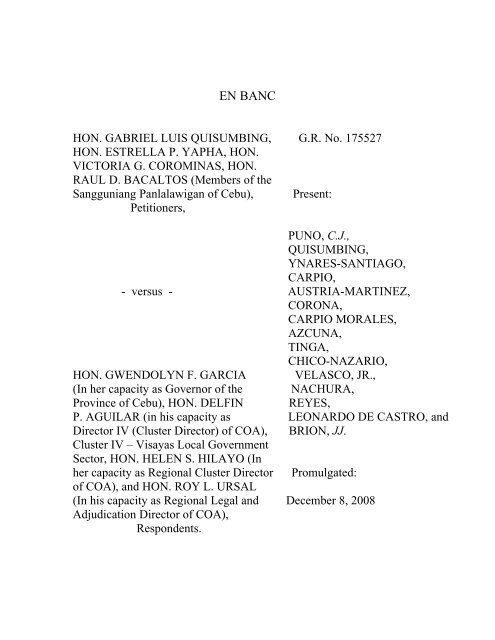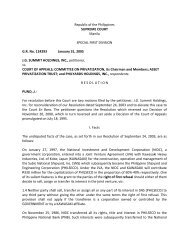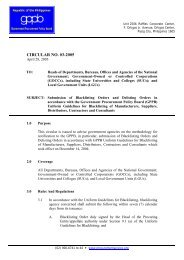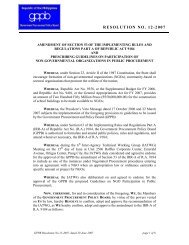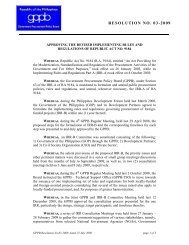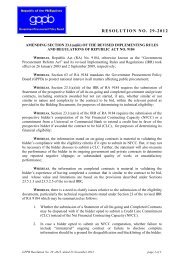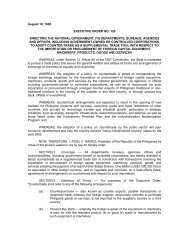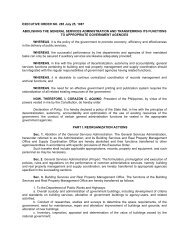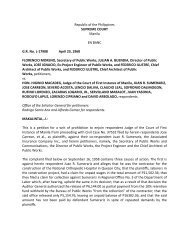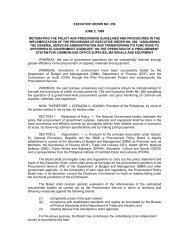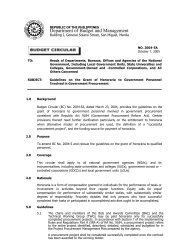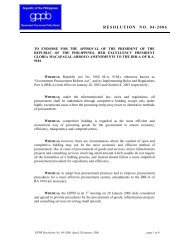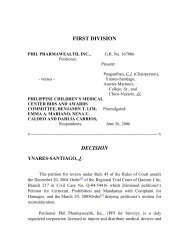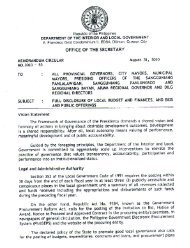G.R. No. 175527 - GPPB
G.R. No. 175527 - GPPB
G.R. No. 175527 - GPPB
You also want an ePaper? Increase the reach of your titles
YUMPU automatically turns print PDFs into web optimized ePapers that Google loves.
EN BANCHON. GABRIEL LUIS QUISUMBING, G.R. <strong>No</strong>. <strong>175527</strong>HON. ESTRELLA P. YAPHA, HON.VICTORIA G. COROMINAS, HON.RAUL D. BACALTOS (Members of theSangguniang Panlalawigan of Cebu), Present:Petitioners,PUNO, C.J.,QUISUMBING,YNARES-SANTIAGO,CARPIO,- versus - AUSTRIA-MARTINEZ,CORONA,CARPIO MORALES,AZCUNA,TINGA,CHICO-NAZARIO,HON. GWENDOLYN F. GARCIA VELASCO, JR.,(In her capacity as Governor of the NACHURA,Province of Cebu), HON. DELFIN REYES,P. AGUILAR (in his capacity as LEONARDO DE CASTRO, andDirector IV (Cluster Director) of COA), BRION, JJ.Cluster IV – Visayas Local GovernmentSector, HON. HELEN S. HILAYO (Inher capacity as Regional Cluster Director Promulgated:of COA), and HON. ROY L. URSAL(In his capacity as Regional Legal and December 8, 2008Adjudication Director of COA),Respondents.
x--------------------------------------------------------------------------- x
D E C I S I O NTINGA, J.:Gabriel Luis Quisumbing (Quisumbing), Estrella P.Yapha, Victoria G. Corominas, and Raul D. Bacaltos (Bacaltos), collectivelypetitioners, assail the Decision [1] of the Regional Trial Court (RTC)of Cebu City, Branch 9, in Civil Case <strong>No</strong>. CEB-31560, dated July 11, 2006,which declared that under the pertinent provisions of Republic Act <strong>No</strong>. 7160(R.A. <strong>No</strong>. 7160), or the Local Government Code, and Republic Act <strong>No</strong>.9184 (R.A. <strong>No</strong>. 9184), or the Government Procurement Reform Act,respondent Cebu Provincial Governor Gwendolyn F. Garcia (Gov. Garcia),need not secure the prior authorization of the SangguniangPanlalawiganbefore entering into contracts committing the province tomonetary obligations.The undisputed facts gathered from the assailed Decision and thepleadings submitted by the parties are as follows:The Commission on Audit (COA) conducted a financial audit onthe Province of Cebu for the period ending December 2004. Itsaudit team rendered a report, Part II of which states: “Severalcontracts in the total amount of P102,092,841.47 were notsupported with a Sangguniang Panlalawigan resolution authorizing
the Provincial Governor to enter into a contract, as required under Section 22of R.A. <strong>No</strong>. 7160.” [2] The audit team then recommended that, “Henceforth,the local chief executive must secure a sanggunian resolution authorizingthe former to enter into a contract as provided under Section 22 of R.A. <strong>No</strong>.7160.” [3]Gov. Garcia, in her capacity as the Provincial Governor of Cebu,sought the reconsideration of the findings and recommendation of the COA.However, without waiting for the resolution of the reconsideration sought,she instituted an action for Declaratory Relief before the RTC of Cebu City,Branch 9. Impleaded as respondents were Delfin P. Aguilar, Helen S.Hilayo and Roy L. Ursal in their official capacities as Cluster Director IV,Regional Cluster Director and Regional Legal and Adjudication Director ofthe COA, respectively. The Sangguniang Panlalawigan ofthe Province of Cebu, represented by Vice-Governor Gregorio Sanchez, Jr.,was also impleaded as respondent.Alleging that the infrastructure contracts [4] subject of the audit reportcomplied with the bidding procedures provided under R.A. <strong>No</strong>. 9184 andwere entered into pursuant to the general and/or supplemental appropriationordinances passed by the Sangguniang Panlalawigan, Gov. Garcia allegedthat a separate authority to enter into such contracts was no longer necessary.On the basis of the parties’ respective memoranda, the trial courtrendered the assailed Decision dated July 11, 2006, declaring that Gov.Garcia need not secure prior authorization from the SangguniangPanlalawigan of Cebu before entering into the questioned contracts. Thedispositive portion of the Decision provides:WHEREFORE, premises considered, this court hereby rendersjudgment in favor of Petitioner and against the Respondent COA officialsand declares that pursuant to Sections 22 paragraph © in relation toSections 306 and 346 of the Local Government Code and Section 37 ofthe Government Procurement Reform Act, the Petitioner Governor ofCebu need not secure prior authorization by way of a resolution from
the Sangguniang Panlalawigan of the Province of Cebu before she entersinto a contract involving monetary obligations on the part of the Provinceof Cebu when there is a prior appropriation ordinance enacted.Insofar as Respondent Sangguniang Panlalawigan, this case ishereby dismissed. [5]In brief, the trial court declared that the SangguniangPanlalawigan does not have juridical personality nor is it vested by R.A. <strong>No</strong>.7160 with authority to sue and be sued. The trial court accordingly dismissedthe case against respondent members of the Sangguniang Panlalawigan. Onthe question of the remedy of declaratory relief being improper because abreach had already been committed, the trial court held that the case wouldripen into and be treated as an ordinary civil action. The trial court furtherruled that it is only when the contract (entered into by the local chiefexecutive) involves obligations which are not backed by prior ordinancesthat the prior authority of the sanggunian concerned is required. In this case,the Sangguniang Panlalawigan of Cebu had already given its priorauthorization when it passed the appropriation ordinances which authorizedthe expenditures in the questioned contracts.The trial court denied the motion for reconsideration [6] filed byQuisumbing, Bacaltos, Carmiano Kintanar, Jose Ma. Gastardo, and AgnesMagpale, in their capacities as members of the SangguniangPanlalawigan of Cebu, in an Order [7] dated October 25, 2006.In the Petition for Review [8] dated <strong>No</strong>vember 22, 2006, petitionersinsisted that the RTC committed reversible error in granting due course toGov. Garcia’s petition for declaratory relief despite a breach of the lawsubject of the petition having already been committed. This breach wasallegedly already the subject of a pending investigation by the DeputyOmbudsman for the Visayas. Petitioners further maintained that priorauthorization from the Sangguniang Panlalawigan should be secured beforeGov. Garcia could validly enter into contracts involving monetaryobligations on the part of the province.
Gov. Garcia, in her Comment [9] dated April 10, 2007, notes that theRTC had already dismissed the case against the members ofthe Sangguniang Panlalawigan of Cebu on the ground that they did not havelegal personality to sue and be sued. Since the COA officials also named asrespondents in the petition for declaratory relief neither filed a motion forreconsideration nor appealed the RTC Decision, the said Decision becamefinal and executory. Moreover, only two of the members of the SangguniangPanlalawigan, namely, petitioners Quisumbing and Bacaltos, originallynamed as respondents in the petition for declaratory relief, filed the instantpetition before the Court.Respondent Governor insists that at the time of the filing of thepetition for declaratory relief, there was not yet any breach of R.A. <strong>No</strong>.7160. She further argues that the questioned contracts were executed after apublic bidding in implementation of specific items in the regular orsupplemental appropriation ordinances passed by the SangguniangPanlalawigan. These ordinances allegedly serve as the authorizationrequired under R.A. <strong>No</strong>. 7160, such that the obtention of anotherauthorization becomes not only redundant but also detrimental to the speedydelivery of basic services.Gov. Garcia also claims that in its Comment to the petition fordeclaratory relief, the Office of the Solicitor General (OSG) took a standsupportive of the governor’s arguments. The OSG’s official positionallegedly binds the COA.Expressing gratitude for having been allowed by this Court to file acomment on the petition, respondent COA officials in theirComment [10] dated March 8, 2007, maintain that Sections 306 and 346 ofR.A. <strong>No</strong>. 7160 cannot be considered exceptions to Sec. 22(c) of R.A. <strong>No</strong>.7160. Sec. 346 allegedly refers to disbursements which must be made inaccordance with an appropriation ordinance without need of approval from
the sanggunian concerned. Sec. 306, on the other hand, refers to theauthorization for the effectivity of the budget and should not be mistaken forthe specific authorization by the Sangguniang Panlalawigan for the localchief executive to enter into contracts under Sec. 22(c) of R.A. <strong>No</strong>. 7160.The question that must be resolved by the Court should allegedly bewhether the appropriation ordinance referred to in Sec. 346 in relation toSec. 306 of R.A. <strong>No</strong>. 7160 is the same prior authorization required underSec. 22(c) of the same law. To uphold the assailed Decision would allegedlygive the local chief executive unbridled authority to enter into any contractas long as an appropriation ordinance or budget has been passed bythe sanggunian concerned.Respondent COA officials also claim that the petition for declaratoryrelief should have been dismissed for the failure of Gov. Garcia to exhaustadministrative remedies, rendering the petition not ripe for judicialdetermination.The OSG filed a Comment [11] dated March 12, 2007, pointing out thatthe instant petition raises factual issues warranting its denial. For instance,petitioners, on one hand, claim that there was no appropriation ordinancepassed for 2004 but only a reenacted appropriations ordinance and that theunauthorized contracts did not proceed from a public bidding pursuant toR.A. <strong>No</strong>. 9184. Gov. Garcia, on the other hand, claims that the contractswere entered into in compliance with the bidding procedures in R.A. <strong>No</strong>.9184 and pursuant to the general and/or supplemental appropriationsordinances passed by the Sangguniang Panlalawigan. She further assertsthat there were ordinances allowing the expenditures made.On the propriety of the action for declaratory relief filed by Gov.Garcia, the OSG states in very general terms that such an action must bebrought before any breach or violation of the statute has been committed andmay be treated as an ordinary action only if the breach occurs after the filingof the action but before the termination thereof. However, it does not say inthis case whether such recourse is proper.
Court to be able to make a definitive ruling on the basic legal arguments ofthe parties.The trial court’s pronouncement that “the parties in this case all agreethat the contracts referred to in the above findings are contracts enteredinto pursuant to the bidding procedures allowed in Republic Act <strong>No</strong>. 9184or the ‘Government Procurement Reform Act’—i.e., public bidding, andnegotiated bid. The biddings were made pursuant to the general and/orsupplemental appropriation ordinances passed by the SangguniangPanlalawigan of Cebu x x x” [14] is clearly belied by the Answer [15] filed bypetitioners herein. Petitioners herein actually argue in their Answer that thecontracts subject of the COA’s findings did not proceed from a publicbidding. Further, there was no budget passed in 2004. What was allegedly inforce was the reenacted 2003 budget. [16]
Gov. Garcia’s contention that the questioned contracts complied withthe bidding procedure in R.A. <strong>No</strong>. 9184 and were entered into pursuant tothe general and supplemental appropriation ordinances allowing theseexpenditures is diametrically at odds with the facts as presented bypetitioners in this case. It is notable, however, that while Gov. Garcia insistson the existence of appropriation ordinances which allegedly authorized herto enter into the questioned contracts, she does not squarely deny that theseordinances pertain to the previous year’s budget which was reenacted in2004.Thus, contrary to the trial court’s finding, there was no agreementamong the parties with regard to the operative facts under which the casewas to be resolved. <strong>No</strong>netheless, we can gather from Gov. Garcia’s silenceon the matter and the OSG’s own discussion on the effect of a reenactedbudget on the local chief executive’s ability to enter into contracts, thatduring the year in question, the Province of Cebu was indeed operatingunder a reenacted budget.<strong>No</strong>te should be taken of the fact that Gov. Garcia, both in her petitionfor declaratory relief and in her Comment on the instant petition, has failedto point out the specific provisions in the general and supplementalappropriation ordinances copiously mentioned in her pleadings whichsupposedly authorized her to enter into the questioned contracts.
Based on the foregoing discussion, there appear two basic premisesfrom which the Court can proceed to discuss the question of whether priorapproval by theSangguniang Panlalawigan was required before Gov. Garciacould have validly entered into the questionedcontracts. First, the Province of Cebu was operating under a reenactedbudget in 2004. Second, Gov. Garcia entered into contracts on behalf ofthe province while this reenacted budget was in force.Sec. 22(c) of R.A. <strong>No</strong>. 7160 provides:Sec. 22. Corporate Powers.—(a) Every local government unit, as acorporation, shall have the following powers:x x x(c) Unless otherwise provided in this Code, no contract may beentered into by the local chief executive in behalf of the local governmentunit without prior authorization by thesanggunian concerned. A legiblecopy of such contract shall be posted at a conspicuous place in theprovincial capitol or the city, municipal or barangay hall.As it clearly appears from the foregoing provision, prior authorizationby the sanggunian concerned is required before the local chief executivemay enter into contracts on behalf of the local government unit.Gov. Garcia posits that Sections 306 and 346 of R.A. <strong>No</strong>. 7160 are theexceptions to Sec. 22(c) and operate to allow her to enter into contracts onbehalf of the Province of Cebu without further authority fromthe Sangguniang Panlalawigan other than that already granted in theappropriation ordinance for 2003 and the supplemental ordinances which,however, she did not care to elucidate on.The cited provisions state:Sec. 306. Definition of Terms.—When used in this Title, the term:(a) “Annual Budget” refers to a financial plan embodying the estimates ofincome and expenditures for one (1) fiscal year;
(b) “Appropriation” refers to an authorization made by ordinance,directing the payment of goods and services from local governmentfunds under specified conditions or for specific purposes;(c) “Budget Document” refers to the instrument used by the local chiefexecutive to present a comprehensive financial plan tothe sanggunian concerned;(d) “Capital Outlays” refers to appropriations for the purchase of goodsand services, the benefits of which extend beyond the fiscal year andwhich add to the assets of the local government unit concerned,including investments in public utilities such as public markets andslaughterhouses;(e) “Continuing Appropriation” refers to an appropriation available tosupport obligations for a specified purpose or projects, such as thosefor the construction of physical structures or for the acquisition of realproperty or equipment, even when these obligations are incurredbeyond the budget year;(f)“Current Operating Expenditures” refers to appropriations for thepurchase of goods and services for the conduct of normal governmentoperations within the fiscal year, including goods and services that willbe used or consumed during the budget year;(g) “Expected Results” refers to the services, products, or benefits thatwill accrue to the public, estimated in terms of performance measuresor physical targets;(h) “Fund” refers to a sum of money, or other assets convertible to cash,set aside for the purpose of carrying out specific activities or attainingcertain objectives in accordance with special regulations, restrictions,or limitations, and constitutes an independent fiscal and accountingentity;(i)(j)“Income” refers to all revenues and receipts collected or receivedforming the gross accretions of funds of the local government unit;“Obligations” refers to an amount committed to be paid by the localgovernment unit for any lawful act made by an accountable officer forand in behalf of the local government unit concerned;
(k) “Personal Services” refers to appropriations for the payment ofsalaries, wages and other compensation of permanent, temporary,contractual, and casual employees of the local government unit;(l)“Receipts” refers to income realized from operations and activities ofthe local government or are received by it in the exercise of itscorporate functions, consisting of charges for services rendered,conveniences furnished, or the price of a commodity sold, as well asloans, contributions or aids from other entities, except provisionaladvances for budgetary purposes; and(m) “Revenue” refers to income derived from the regular system oftaxation enforced under authority of law or ordinance and, as such,accrue more or less regularly every year.x x xSec. 346. Disbursements of Local Funds and Statement ofAccounts.—Disbursements shall be made in accordance with the ordinanceauthorizing the annual or supplemental appropriations without the priorapproval of the sanggunian concerned. Within thirty (3) days after theclose of each month, the local accountant shall furnishthe sanggunian with such financial statements as may be prescribed by theCOA. In the case of the year-end statement of accounts, the period shall besixty (60) days after the thirty-first (31 st ) of December.Sec. 306 of R.A. <strong>No</strong>. 7160 merely contains a definition of terms. Readin conjunction with Sec. 346, Sec. 306 authorizes the local chief executive tomake disbursements of funds in accordance with the ordinance authorizingthe annual or supplemental appropriations. The “ordinance” referred to inSec. 346 pertains to that which enacts the local government unit’s budget,for which reason no further authorization from the local council is required,the ordinance functioning, as it does, as the legislative authorization of thebudget. [17]To construe Sections 306 and 346 of R.A. <strong>No</strong>. 7160 as exceptions toSec. 22(c) would render the requirement of prior sanggunian authorizationsuperfluous, useless and irrelevant. There would be no instance when such
prior authorization would be required, as in contracts involving thedisbursement of appropriated funds. Yet, this is obviously not the effectCongress had in mind when it required, as a condition to the local chiefexecutive’s representation of the local government unit in businesstransactions, the prior authorization of the sanggunian concerned. Therequirement was deliberately added as a measure of check and balance, totemper the authority of the local chief executive, and in recognition of thefact that the corporate powers of the local government unit are wielded asmuch by its chief executive as by its council. [18] However, as will bediscussed later, the sanggunian authorization may be in the form of anappropriation ordinance passed for the year which specifically covers theproject, cost or contract to be entered into by the local government unit.The fact that the Province of Cebu operated under a reenacted budgetin 2004 lent a complexion to this case which the trial court did notapprehend. Sec. 323 of R.A. <strong>No</strong>. 7160 provides that in case of a reenactedbudget, “only the annual appropriations for salaries and wages of existingpositions, statutory and contractual obligations, and essential operatingexpenses authorized in the annual and supplemental budgets for thepreceding year shall be deemed reenacted and disbursement of funds shall bein accordance therewith.” [19]It should be observed that, as indicated by the word “only” precedingthe above enumeration in Sec. 323, the items for which disbursements maybe made under a reenacted budget are exclusive. Clearly, contractualobligations which were not included in the previous year’s annual andsupplemental budgets cannot be disbursed by the local government unit. Itfollows, too, that new contracts entered into by the local chief executiverequire the prior approval of the sanggunian.We agree with the OSG that the words “disbursement” and “contract”separately referred to in Sec. 346 and 22(c) of R.A. <strong>No</strong>. 7160 should beunderstood in their common signification. Disbursement is defined as “Topay out, commonly from a fund. To make payment in settlement of a debt oraccount payable.” [20] Contract, on the other hand, is defined by our CivilCode as “a meeting of minds between two persons whereby one binds
himself, with respect to the other, to give something or to render someservice.” [21]And so, to give life to the obvious intendment of the law and to avoida construction which would render Sec. 22(c) of R.A. <strong>No</strong>. 7160meaningless, [22] disbursement, as used in Sec. 346, should be understood topertain to payments for statutory and contractual obligations whichthe sanggunian has already authorized thru ordinances enacting the annualbudget and are therefore already subsisting obligations of the localgovernment unit. Contracts, as used in Sec. 22(c) on the other hand, arethose which bind the local government unit to new obligations, with theircorresponding terms and conditions, for which the local chief executiveneeds prior authority from the sanggunian.Elsewhere in R.A. <strong>No</strong>. 7160 are found provisions which buttress thestand taken by petitioners against Gov. Garcia’s seemingly heedless actions.Sec. 465, Art. 1, Chapter 3 of R.A. <strong>No</strong>. 7160 states that the provincialgovernor shall “[r]epresent the province in all its business transactionsand sign in its behalf all bonds, contracts, and obligations, and suchother documents upon authority of the sangguniang panlalawigan orpursuant to law or ordinances.” Sec. 468, Art. 3 of the same chapter alsoestablishes the sanggunian’s power, as the province’s legislative body, toauthorize the provincial governor to negotiate and contract loans, leasepublic buildings held in a proprietary capacity to private parties, amongother things.The foregoing inexorably confirms the indispensability ofthe sanggunian’s authorization in the execution of contracts which bind thelocal government unit to new obligations. <strong>No</strong>te should be taken of the factthat R.A. <strong>No</strong>. 7160 does not expressly state the form that the authorizationby the sanggunian has to take. Such authorization may be done byresolution enacted in the same manner prescribed by ordinances, except thatthe resolution need not go through a third reading for final considerationunless the majority of all the members of the sanggunian decidesotherwise. [23]
As regards the trial court’s pronouncement that R.A. <strong>No</strong>. 9184 doesnot require the head of the procuring entity to secure a resolution fromthe sanggunianconcerned before entering into a contract, attention should bedrawn to the very same provision upon which the trial court based itsconclusion. Sec. 37 provides: “The Procuring Entity shall issue the <strong>No</strong>ticeto Proceed to the winning bidder not later than seven (7) calendar days fromthe date of approval of the contract by the appropriate authority x x x.”R.A. <strong>No</strong>. 9184 establishes the law and procedure for publicprocurement. Sec. 37 thereof explicitly makes the approval of theappropriate authority which, in the case of local government units, isthe sanggunian, the point of reference for the notice to proceed to be issuedto the winning bidder. This provision, rather than being in conflict with orproviding an exception to Sec. 22(c) of R.A. <strong>No</strong>. 7160, blends seamlesslywith the latter and even acknowledges that in the exercise of the localgovernment unit’s corporate powers, the chief executive acts merely as aninstrumentality of the local council. Read together, the cited provisionsmandate the local chief executive to secure the sanggunian’s approvalbefore entering into procurement contracts and to transmit the notice toproceed to the winning bidder not later than seven (7) calendar daystherefrom.Parenthetically, Gov. Garcia’s petition for declaratory relief shouldhave been dismissed because it was instituted after the COAhad already found her in violation of Sec. 22(c) of R.A. <strong>No</strong>. 7160.One of the important requirements for a petition for declaratory relief underSec. 1, Rule 63 of the Rules of Court is that it be filed before breach orviolation of a deed, will, contract, other written instrument, statute, executiveorder, regulation, ordinance or any other governmental regulation.In Martelino v. National Home Mortgage Finance Corporation, [24] weheld that the purpose of the action is to secure an authoritative statement ofthe rights and obligations of the parties under a statute, deed, contract, etc.,for their guidance in its enforcement or compliance and not to settle issuesarising from its alleged breach. It may be entertained only before the breachor violation of the statute, deed, contract, etc. to which it refers. Where the
law or contract has already been contravened prior to the filing of an actionfor declaratory relief, the court can no longer assume jurisdiction over theaction. Under such circumstances, inasmuch as a cause of action has alreadyaccrued in favor of one or the other party, there is nothing more for the courtto explain or clarify, short of a judgment or final order.Thus, the trial court erred in assuming jurisdiction over the actiondespite the fact that the subject thereof had already been breached by Gov.Garcia prior to the filing of the action. <strong>No</strong>netheless, the conversion of thepetition into an ordinary civil action is warranted under Sec. 6, Rule 63 [25] ofthe Rules of Court.Erroneously, however, the trial court did not treat the COA report as abreach of the law and proceeded to resolve the issues as it would have in adeclaratory relief action. Thus, it ruled that prior authorization is notrequired if there exist ordinances which authorize the local chief executive toenter into contracts. The problem with this ruling is that it fails to take heedof the incongruent facts presented by the parties. What the trial court shouldhave done, instead of deciding the case based merely on the memorandasubmitted by the parties, was to conduct a full-blown trial to thresh out thefacts and make an informed and complete decision.
As things stand, the declaration of the trial court to the effect that noprior authorization is required when there is a prior appropriation ordinanceenacted does not put the controversy to rest. The question which shouldhave been answered by the trial court, and which it failed to do was whether,during the period in question, there did exist ordinances (authorizing Gov.Garcia to enter into the questioned contracts) which rendered the obtentionof another authorization from the Sangguniang Panlalawigan superfluous. Itshould also have determined the character of the questionedcontracts, i.e., whether they were, as Gov. Garcia claims, meredisbursements pursuant to the ordinances supposedly passed bythe sanggunian or, as petitioners claim, new contracts which obligate theprovince without the provincial board’s authority.It cannot be overemphasized that the paramount consideration in thepresent controversy is the fact that the Province of Cebu was operating undera re-enacted budget in 2004, resulting in an altogether different set of rulesas directed by Sec. 323 of R.A. 7160. This Decision, however, should notbe so construed as to proscribe any and all contracts entered into by the localchief executive without formal sanggunian authorization. In cases, forinstance, where the local government unit operates under an annual asopposed to a re-enacted budget, it should be acknowledged that theappropriation passed by the sanggunian may validly serve as theauthorization required under Sec. 22(c) of R.A. <strong>No</strong>. 7160. After all, anappropriation is an authorization made by ordinance, directing the paymentof goods and services from local government funds under specifiedconditions or for specific purposes. The appropriation covers theexpenditures which are to be made by the local government unit, such ascurrent operating expenditures [26] and capital outlays. [27]The question of whether a sanggunian authorization separate from theappropriation ordinance is required should be resolved depending on theparticular circumstances of the case. Resort to the appropriation ordinanceis necessary in order to determine if there is a provision therein whichspecifically covers the expense to be incurred or the contract to be enteredinto. Should the appropriation ordinance, for instance, already contain in
sufficient detail the project and cost of a capital outlay such that all that thelocal chief executive needs to do after undergoing the requisite publicbidding is to execute the contract, no further authorization is required, theappropriation ordinance already being sufficient.On the other hand, should the appropriation ordinance describe theprojects in generic terms such as “infrastructure projects,” “inter-municipalwaterworks, drainage and sewerage, flood control, and irrigation systemsprojects,” “reclamation projects” or “roads and bridges,” there is an obviousneed for a covering contract for every specific project that in turn requiresapproval by the sanggunian. Specific sanggunian approval may also berequired for the purchase of goods and services which are neither specifiedin the appropriation ordinance nor encompassed within the regular personalservices and maintenance operating expenses.In view of the foregoing, the instant case should be treated as anordinary civil action requiring for its complete adjudication the confluenceof all relevant facts. Guided by the framework laid out in this Decision, thetrial court should receive further evidence in order to determine the nature ofthe questioned contracts entered into by Gov. Garcia, and the existence ofordinances authorizing her acts.WHEREFORE, the petition is GRANTED IN PART. The Decisiondated July 11, 2006, of the Regional Trial Court of Cebu City, Branch 9, inCivil Case <strong>No</strong>. CEB-31560, and its Order dated October 25, 2006, areREVERSED and SET ASIDE. The case is REMANDED to the court aquo for further proceedings in accordance with this Decision. <strong>No</strong>pronouncement as to costs.SO ORDERED.
DANTE O. TINGAAssociate JusticeWE CONCUR:REYNATO S. PUNOChief JusticeLEONARDO A. QUISUMBINGAssociate JusticeCONSUELO YNARES-SANTIAGOAssociate JusticeANTONIO T. CARPIOAssociate JusticeMA. ALICIA AUSTRIA-MARTINEZAssociate JusticeRENATO C. CORONAAssociate JusticeCONCHITA CARPIO MORALESAssociate Justice
ADOLFO S. AZCUNAAssociate JusticeMINITA V. CHICO-NAZARIOAssociate JusticePRESBITERO J. VELASCO, JR.Associate JusticeANTONIO EDUARDO B. NACHURAAssociate JusticeRUBEN T. REYESAssociate JusticeTERESITA J. LEONARDO DE CASTROAssociate JusticeARTURO D. BRIONAssociate JusticeC E R T I F I C A T I O NPursuant to Article VIII, Section 13 of the Constitution, it ishereby certified that the conclusions in the above Decision werereached in consultation before the case was assigned to the writer of theopinion of the Court.REYNATO S. PUNOChief Justice
[1] Rollo, pp. 32-39.[2] Id. at 32.[3] Id.[4] Id. at 147; the COA claims that the contracts over which it took exceptionwere mostly infrastructure contracts; Answer to the petition for declaratory relief.[5] Id. at 39.[6] Id. at 40-44.[7] Id. at 46-48.[8] Id. at 4-26.[9] Id. at 100-121.[10] Id. at 123-140.[11] Id. at 229-255.[12] Id. at 258-269.[13] Id. at 77-82.[14] Id. at 32-33.[15] Id. at 65-69.[16] Id. at 66.[17] REPUBLIC ACT NO. 7160 (1992), Sec. 319 provides that, “On or before the end of thecurrent fiscal year, the sanggunian concerned shall enact, through an ordinance, the annual budget of thelocal government unit for the ensuing fiscal year on the basis of the estimates of income and expendituressubmitted by the local chief executive.”[18] The Sangguniang Panlalawigan is specifically given the mandate to participate in the exerciseof the corporate powers of the province as provided for under Sec. 22 of R.A. 7160 and confirmed by Sec.468 of the same law.[19] REPUBLIC ACT NO. 7160 (1992), Sec. 323.[20] BLACK’S LAW DICTIONARY, SPECIAL DELUXE 5 th Ed., 1979, p. 416.[21] Art. 1305.
[22] As a rule of statutory construction, a provision of a statute should be so construed as not tonullify or render nugatory another provision of the same statute. Interpretate fienda est res valeat quampereat. People v. Gatchalian, 104 Phil. 664 (1958).[23] RULES AND REGULATIONS IMPLEMENTING THE LOCAL GOVERNMENT CODEOF 1991 (1992), Art. 107(c),[24] G.R. <strong>No</strong>. 160208, June 30, 2008.[25] Sec. 6. Conversion into ordinary action.—If before the final termination of the case, a breach orviolation of an instrument or a statute, executive order or regulation, ordinance, or any other governmentalregulation should take place, the action may thereupon be converted into an ordinary action, and the partiesshall be allowed to file such pleadings as may be necessary or proper.[26] Current operating expenditures refer to appropriations for the purchase of goods and servicesfor current consumption or for benefits expected to terminate within the fiscal year. It is classified intopersonal services and maintenance and operating expenses. Sec. 155(a), Government Accounting andAuditing Manual (GAAM), Vol. 1.[27] Capital outlays refer to appropriations for the purchase of goods and services, the benefits ofwhich extend beyond the fiscal year and which add to the assets of government, including investments inthe capital of government-owned or controlled corporations and their subsidiaries, as well as investments inpublic utilities such as public markets and slaughterhouses. Sec. 155(b), GAAM, Vol. 1.


